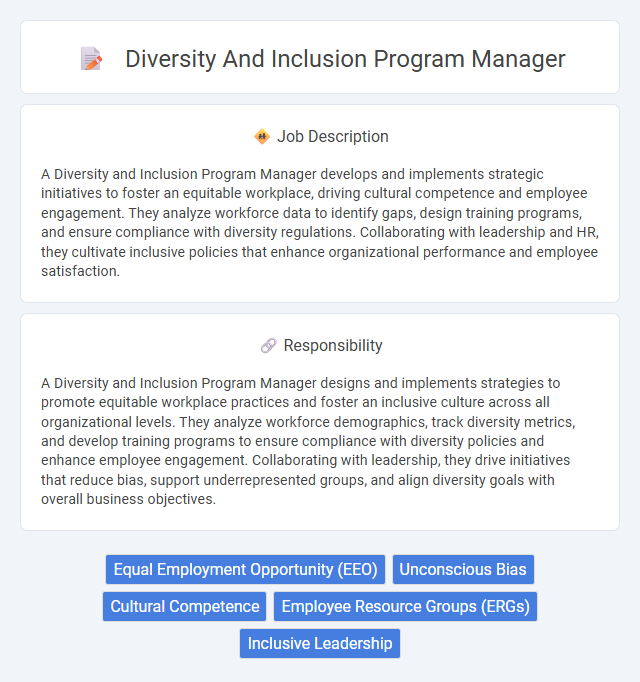
A Diversity and Inclusion Program Manager develops and implements strategic initiatives to foster an equitable workplace, driving cultural competence and employee engagement. They analyze workforce data to identify gaps, design training programs, and ensure compliance with diversity regulations. Collaborating with leadership and HR, they cultivate inclusive policies that enhance organizational performance and employee satisfaction.
Individuals with strong interpersonal skills and a genuine passion for fostering equitable work environments are likely to thrive as Diversity and Inclusion Program Managers. Those comfortable navigating complex organizational dynamics and advocating for underrepresented groups will probably find this role suitable. Candidates lacking empathy or the ability to engage diverse stakeholders may struggle to succeed in this position.
Qualification
Expertise in human resources, organizational development, or social sciences is essential for a Diversity and Inclusion Program Manager, often requiring a bachelor's or master's degree. Proven experience in managing diversity initiatives, cultural competence, and familiarity with equal employment opportunity laws enhance effectiveness in driving inclusive workplace strategies. Strong skills in data analysis, communication, and stakeholder engagement contribute to designing and implementing impactful diversity programs.
Responsibility
A Diversity and Inclusion Program Manager designs and implements strategies to promote equitable workplace practices and foster an inclusive culture across all organizational levels. They analyze workforce demographics, track diversity metrics, and develop training programs to ensure compliance with diversity policies and enhance employee engagement. Collaborating with leadership, they drive initiatives that reduce bias, support underrepresented groups, and align diversity goals with overall business objectives.
Benefit
A Diversity and Inclusion Program Manager is likely to enhance workplace culture by fostering an inclusive environment where diverse perspectives thrive, which may lead to increased employee engagement and innovation. This role probably contributes to improved company reputation and compliance with equal opportunity regulations, potentially attracting top talent from varied backgrounds. Companies investing in such managers typically experience better team collaboration and a stronger overall business performance.
Challenge
Managing a Diversity and Inclusion Program may involve navigating complex organizational resistance and addressing deeply ingrained biases that challenge progress. The probability of encountering shifting priorities or limited resources could also impact the program's effectiveness. Success often depends on strategic communication and fostering genuine stakeholder engagement to overcome these obstacles.
Career Advancement
A Diversity and Inclusion Program Manager drives strategic initiatives that foster equitable workplace environments and promote organizational culture shifts. Mastery in change management, data-driven diversity metrics, and cross-functional collaboration enhances career progression opportunities in this role. Advancing to senior leadership positions often requires demonstrable impact on inclusion goals and the ability to influence executive decision-making.
Key Terms
Equal Employment Opportunity (EEO)
A Diversity and Inclusion Program Manager spearheads initiatives that promote Equal Employment Opportunity (EEO) within organizations, ensuring compliance with federal regulations and fostering a workplace free from discrimination. This role involves developing training programs, conducting audits, and collaborating with HR to implement policies that support equitable hiring, retention, and advancement for all employees. By leveraging data analytics and employee feedback, the manager continuously monitors EEO effectiveness and drives cultural change toward inclusivity.
Unconscious Bias
A Diversity and Inclusion Program Manager specializing in unconscious bias develops and implements training programs designed to identify and mitigate implicit prejudices within the workplace. They utilize evidence-based strategies and data analytics to assess organizational culture and measure the impact of unconscious bias interventions on employee engagement and equity. Collaborating with leadership, they drive systemic change by embedding inclusive practices into recruitment, promotion, and decision-making processes.
Cultural Competence
A Diversity and Inclusion Program Manager spearheads initiatives that enhance cultural competence within organizations by developing training programs and fostering an inclusive workplace environment. They collaborate with leadership and employees to implement strategies that address cultural biases and promote cross-cultural understanding. Measuring the impact of these programs through employee feedback and diversity metrics ensures continuous improvement and alignment with organizational goals.
Employee Resource Groups (ERGs)
A Diversity and Inclusion Program Manager specializing in Employee Resource Groups (ERGs) drives strategic initiatives to foster an inclusive workplace by supporting and expanding ERG frameworks. They coordinate cross-functional collaboration, facilitate leadership training, and implement metrics to measure the impact of ERG activities on employee engagement and retention. This role requires expertise in cultural competency, program development, and stakeholder engagement to effectively empower diverse employee communities.
Inclusive Leadership
A Diversity and Inclusion Program Manager drives strategic initiatives to foster inclusive leadership by developing training programs that enhance cultural competence and unconscious bias awareness among organizational leaders. They collaborate with executive teams to integrate inclusive practices into leadership development, ensuring policies support equity and belonging across all levels. Measuring the impact through diversity metrics and employee engagement surveys, the manager continuously refines strategies to create a more inclusive workplace culture.
 kuljobs.com
kuljobs.com